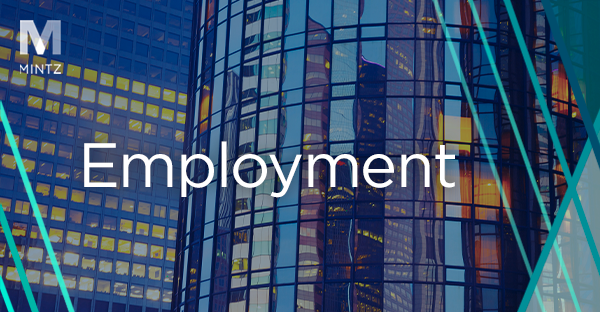
Employment
Viewpoints
Filter by:
Federal Court in Florida Issues Another Limited Preliminary Injunction Against the FTC’s Non-Compete Rule
August 19, 2024 | Blog | By Michael Arnold, Corbin Carter, Talia Weseley
On August 14th, a second federal judge, this time out of the Middle District of Florida, temporarily blocked the FTC’s rule banning non-compete agreements, but only as to the named plaintiff in that case.
Employer FAQ: Massachusetts’s New Pay Transparency And Pay Data Reporting Requirements
August 7, 2024 | Blog | By Natalie C. Groot, Delaney Busch
Massachusetts has passed into law An Act Relative to Salary Range Transparency (the “Act”), which means that pay transparency and pay data reporting requirements will soon become official. In advance of the effective dates in 2025, covered businesses must understand and prepare for new compliance obligations.
We previously wrote about this Act in its legislation phase here. In addition, information regarding other jurisdictions requiring wage transparency, such as California, New York, and Washington, are available in our previous articles here and here.
Federal Court in Texas Issues Limited Preliminarily Injunction Stopping the FTC’s Non-Compete Rule
July 4, 2024 | | By Danielle Bereznay, Corbin Carter, Michael Arnold
On July 3, 2024, the Federal District Court in the Northern District of Texas in Ryan LLC v. Federal Trade Commission granted a preliminary injunction staying the effective date of the FTC’s non-compete rule and enjoining the FTC from enforcing it against the specific plaintiffs who challenged it (Ryan, LLC, the US Chamber of Commerce, and a few other business groups which were previously permitted to intervene in the lawsuit). The Court declined to enter a nationwide injunction, and, absent additional legal developments or a voluntary nationwide stay by the FTC, the non-compete rule is still set to go into effect on September 4, 2024 for all other covered employers. In its decision, the Court indicated that it intends to rule on the merits of the case by August 30, 2024, in advance of the rule’s September 4, 2024 effective date.
A New Chapter in California’s Ongoing PAGA is Lava Saga: PAGA Reform
July 3, 2024 | Blog | By Jennifer Rubin, Paul Huston, Kevin Kim
Major changes to PAGA are now official. Most importantly:
- Employees must have experienced each of the alleged violations to have standing to sue;
- Employers can correct inaccuracies on paystubs without penalty; and
- Employers who take specific steps to prevent Labor Code violations will be able to substantially reduce liability.
Maryland Employers: Amended Pay Transparency Law Requires Wage Range Disclosure in Job Postings
July 1, 2024 | Blog | By David Barmak, Danielle Bereznay
Maryland was one of the first states to implement a pay transparency law in 2020, and now it joins several states in broadening that law to require employers to disclose a wage range for open positions (Washington, D.C.’s pay transparency law, for example, which we wrote about here will become effective on June 30, 2024). Since 2020, employers in Maryland have been required to provide, when requested by an applicant, the wage range for the position to which the applicant applied. Maryland will now require employers to proactively disclose in their public and internal job postings the wage range for the position. Maryland’s new law will go into effect on October 1, 2024.
New York State Now Requires Paid Lactation Breaks
June 28, 2024 | Blog | By Talia Weseley, Evan Piercey
A New Dawn (Maybe) for California Employers: State and Business Groups Strike Deal on PAGA Reform
June 20, 2024 | Blog | By Jennifer Rubin, Paul Huston, Mike Flesuras
On June 18, 2024, Governor Newsom, in collaboration with legislative leaders, unveiled a landmark agreement to reform the Private Attorneys General Act (PAGA).
EEOC PWFA Final Rule Goes Into Effect June 18, 2024: Key Takeaways for Employers
June 17, 2024 | Blog | By Delaney Busch, Kevin Kim
Mintz’s Employment Practice will continue to monitor any future developments and legal challenges and remains ready to assist employers with compliance with the PWFA and the EEOC’s final rule.
California Employers: the July 1, 2024 California Violence Prevention Deadline is Quickly Approaching – Do You Know What Your Obligations Are?
June 14, 2024 | Alert | By Kevin Kim, Nicole Rivers, Jennifer Rubin
A gentle reminder for California employers: the clock is ticking on your obligations to prepare a workplace violence prevention plan and conduct a training session on that plan under California’s new violence prevention plan law (SB 553).
Update: EEOC Issues Final Guidance on Workplace Harassment
May 29, 2024 | Blog | By Delaney Busch, Kathryn Droumbakis, Tom J. Pagliarini, Michael Arnold
AI in the Workplace: Navigating Compliance Considerations and Planning for the Future
May 24, 2024 | Video | By Michelle Capezza, Corbin Carter, Evan Piercey
What the FTC’s New Rule on Non-Competes Means for M&A and Private Equity Transactions
May 23, 2024 | Article | By Benjamin Ferrucci, Brendan Lowd, Nicole Rivers, Zachary Liebnick
The Federal Trade Commission (FTC)’s new rule to ban most post-employment non-compete agreements could significantly impact M&A and private equity transactions. Assuming it withstands legal challenges, the rule will require buyers and private equity sponsors to rethink many of their asset protection strategies.
DOL Releases Final Rule Substantially Increasing Minimum Salary Thresholds for Most Exempt Employees
April 25, 2024 | Blog | By Andrew Matzkin, Evan Piercey
In Split Vote, FTC Approves Controversial Final Rule Banning Most Post-Employment Non-Competes; Rule Already Subject to Challenge in Court
April 25, 2024 | Blog | By Talia Weseley, Danielle Bereznay, Bruce Sokler, Benjamin Ferrucci, David Barmak, Brad M Scheller, Geri Haight, Michael Arnold
Some Harm is All it Takes – the Supreme Court Lowers the Bar For Title VII Discrimination Claims Involving Lateral Job Transfers.
April 22, 2024 | Blog | By Paul Huston, Delaney Busch
NYC “Know Your Rights” Poster and Bill of Rights Website Now Live
April 22, 2024 | Blog | By Corbin Carter, Talia Weseley
Everything You Always Wanted to Know About California’s Workplace Violence Prevention Plan (But Were Afraid to Ask) Some Updated Answers to Frequently Asked Questions On California’s New Law
April 9, 2024 | Blog | By Jennifer Rubin, Nicole Rivers, Kevin Kim
Minimum Wage Increases and Ontario Employment Shake-up: What Employers Need to Know
April 8, 2024 | Blog | By Mitch Frazer, Brad Tartick, Patrick Denroche
The CDC Issues New COVID-Related Guidance: What This Means for Employers
March 26, 2024 | Blog | By Andrew Bernstein, Kathryn Droumbakis
Explore Other Viewpoints:
- Data Centers & Digital Infrastructure
- AI: The Washington Report
- Antitrust and Federal Regulation
- Appellate
- Arbitration, Mediation & Alternate Dispute Resolution
- Artificial Intelligence
- Awards
- Bankruptcy & Restructuring
- California Land Use
- Cannabis
- Class Action
- Complex Commercial Litigation
- Construction
- Consumer Product Safety
- Corporate Governance (ESG)
- Cross-Border Asset Recovery
- DEI Legal Developments
- Debt Financing
- Direct Investing (M&A)
- Diversity
- EB-5 Financing
- Education & Nonprofits
- Employment
- EnforceMintz
- Environmental (ESG)
- Environmental Enforcement Defense
- Environmental Law
- Environmental, Social, and Corporate Governance (ESG)
- FDA Regulatory
- FDA in Flux
- False Claims Act
- Federal Circuit Appeals
- Financial Institution Litigation
- Government Law
- Growth Equity
- Health Care
- Health Care Compliance, Fraud and Abuse, & Regulatory Counseling
- Health Care Enforcement & Investigations
- Health Care Transactions
- Health Information Privacy & Security
- IP Due Diligence
- IPRs & Other Post Grant Proceedings
- Immigration
- Impacts of a New US Administration
- Insolvency & Creditor Rights Litigation
- Institutional Investor Class Action Recovery
- Insurance & Financial Services
- Insurance Consulting & Risk Management
- Insurance and Reinsurance Problem-Solving & Dispute Resolution
- Intellectual Property
- Investment Funds
- Israel
- Licensing & Technology Transactions
- Life Sciences
- Litigation & Investigations
- M&A Litigation
- ML Strategies
- Managed Care
- Medicare, Medicaid and Commercial Coverage & Reimbursement
- Mergers & Acquisitions
- Patent Litigation
- Patent Prosecution & Strategic Counseling
- Pharmacy Benefits and PBM Contracting
- Portfolio Companies
- Privacy & Cybersecurity
- Private Client
- Private Equity
- Pro Bono
- Probate & Fiduciary Litigation
- Products Liability & Complex Tort
- Projects & Infrastructure
- Public Finance
- Real Estate Litigation
- Real Estate Transactions
- Real Estate, Construction & Infrastructure
- Retail & Consumer Products
- Securities & Capital Markets
- Securities Litigation
- Social (ESG)
- Special Purpose Acquisition Company (SPACs)
- Sports & Entertainment
- State Attorneys General
- Strategic IP Monetization & Licensing
- Sustainable Energy & Infrastructure
- Tax
- Technology
- Technology, Communications & Media
- Technology, Communications & Media Litigation
- Trade Secrets
- Trademark & Copyright
- Trademark Litigation
- Unified Patent Court (UPC)
- Value-Based Care
- Venture Capital & Emerging Companies
- White Collar Defense & Government Investigations
- Women's Health and Technology








